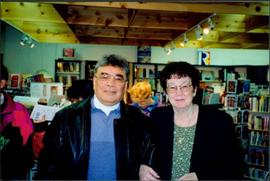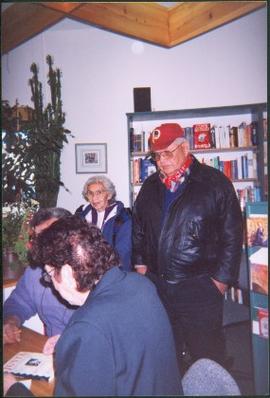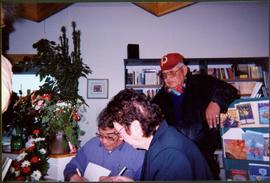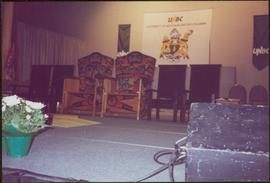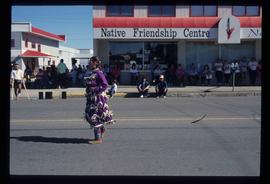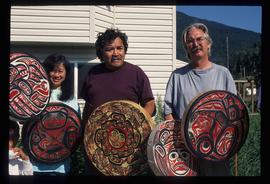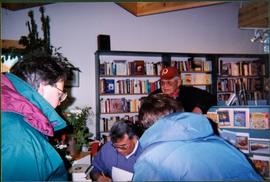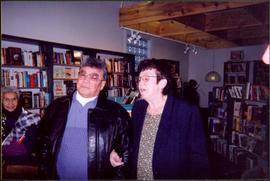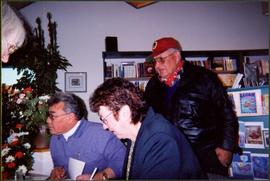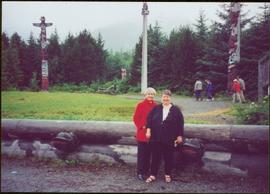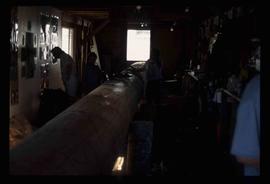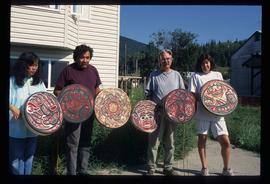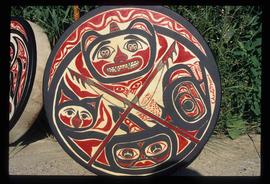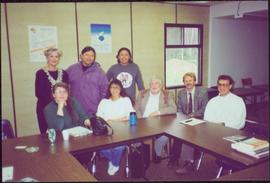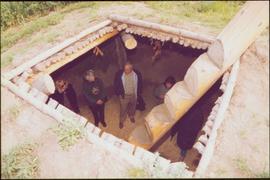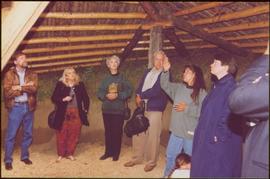Justa Monk and Bridget Moran stand in foreground. Unidentified individuals can be seen in bookstore in background. Bridget Moran published a book in 1994 entitled 'Justa: A First Nations Leader, Dakelhne Butsowhudilhzulh'un'.
Photograph depicts Justa Monk and Bridget Moran seated at table, signing copies of 'Justa: a First Nations Leader'. Plants, bookshelves, and two unidentified individuals in background.
Photograph depicts Justa Monk and Bridget Moran seated in bookstore, bookshelves in background.
Photograph depicts Justa Monk and Bridget Moran seated at table, signing copies of 'Justa: a First Nations Leader'. Plants, bookshelves, and unidentified man visible in background.
File consists of a Teacher's Guide for Justa.
Item is a audio interview recorded by Bridget Moran with Justa Monk.
Audiocassette Summary
00’ 01” Justa is talking about the Kemano II Project, which he states is a political issue, not an environmental one. He says the Project is a public issue now, not just a First Nations issue.
06’ 52” Moran asks Justa about when he was elected to tribal chief. He talks about the nominations process.
09’ 52” End of tape.
Item is a audio interview recorded by Bridget Moran with Justa Monk.
Audiocassette Summary
00’ 04” Moran is talking about book signings for Justa’s book.
00’ 27” Justa and Moran talk about board members for the Kemano II Project. They continue to talk about the Kemano II Project. Justa says the amount of pressure he is putting on the government, combined with public support, hopefully means Kemano II will be stopped. They continue to discuss the details and the politics surrounding the Project.
10’ 26” Moran asks Justa whether he was surprised or not when he lost the position of tribal chief at the last Assembly. He tells her he was not surprised. He talks about the first time he resigned from the position due to stress. He says the band knew he was tired, so did not want the position any longer. In a letter he wrote, he stated it was time for some new blood.
21’ 11” Moran asks Justa about his new position. He talks about being a contractor to Northwood Pulp and Timber where he liaisons between First Nations people and the company on employment concerns and tree sales. He talks about his position in more detail.
28’ 46” Moran asks Justa about how he feels about his life now. He tells her he feels good about what he has accomplished, but he needs a rest. He talks about his accomplishments throughout his career. He tells Moran he has no regrets about anything.
37’ 55” Moran asks Justa about his health issues and how he is feeling now.
38’ 57” End of tape.
File consists of speaking notes for a presentation of Ainley's research for her Social Science and Humanities Research Council (SSHRC) funded project, "Engendering Canadian Science: Biographies of Women Scientists"; an abstract for Ainley's article "British Scientists in Canadian fields: Catharine Parr Traill (1802-1899)"; and a draft section from "Creating Complicated Lives: Women and Science at English-Canadian Universities, 1880-1980."
Stamped annotation on verso reads: "MAY 1994".
Image depicts a woman, wearing clothes reminiscent of traditional First Nations, who appears to be dancing in the street outside of a Native Friendship Centre in Prince George, B.C. A large crowd is looking on.
Image depicts several unidentified individuals standing outside a building, and holding intricately painted drums. The location is uncertain.
Series consists of reports, proposals, and project and research materials ranging from 1994 to 2006. Series includes reports on Sustainable Forest Management, proposals for planned project phases, consultant reports, symposia notes and ephemera, secondary source research for projects and planning, and reports on work with First Nations communities.
File consists of speaking notes for a speech made by Ainley on December 6, 2000 at a memorial for the Ecole Polytechnique Massacre in Montreal, Quebec; Ainley's retirement speech speaking notes; and speaking notes for a presentation of Ainley's research for her Social Science and Humanities Research Council (SSHRC) funded project, "Engendering Canadian Science: Biographies of Women Scientists."
Photograph depicts three unidentified individuals gathered around Justa Monk as he signs a copy of 'Justa: a First Nations Leader'. Plants and bookshelves in background.
Photograph depicts Justa Monk and Bridget Moran standing in bookstore. Unidentified woman and bookshelves in background.
Photograph depicts Justa Monk and Bridget Moran seated at table, signing copies of 'Justa: a First Nations Leader'. Plants, bookshelves, two unidentified individuals also visible in image.
Item is a audio interview recorded by Bridget Moran with Justa Monk.
Audiocassette Summary
00’03” Moran asks Justa how the Department of Indian Affairs party went at Other Art Cafe.
01’20” Moran tells Justa she has a number of questions regarding his political career. They talk about the number of bands in the area.
05’ 11” Justa talks about the nomination process for becoming tribal chief at the annual Assembly. He talks about when he was nominated and how he believed that he was nominated based on his character. Moran asks about the culture surrounding the Assembly, including entertainment. Justa tells her he did not participate in any of the activities.
12’ 41” Justa talks about his mother loving potlatch.
14’ 35” Moran asks Justa about the personal qualities it takes to be tribal chief. He tells her he was nominated because the people knew and trusted him.
16’ 03” Moran asks Justa about the role he played in getting the Department of Indian Affairs shut down. He tells her about leading a mandate to close the Prince George office through lawyers and the support of his people.
25’ 18” Moran asks Justa about the development of a school board for the reservations. He wants the school curriculum to teach the language and the culture. He has negotiated with the federal and provincial governments to implement these plans.
29’ 13” Moran asks Justa about his role in land claims. Justa talks about negotiating with the government to get some of the land back to his people. He has played a big role, he says, because he knows the area, the language, and the people. He talks about the long, drawn out process of planning the land claims concerns. Justa has a mandate as tribal chief to address land claims. He says the important part of the process is educating the people, white and non-white.
45’ 49” Moran is talking about Alcan locating grave markers to compensate for the damage done from the original Kemano project.
47’ 47” Moran asks Justa the role he has played in the Kemano II Project. He tells her that he took a big role because he saw the way of life being destroyed, never mind the environmental damage. He says he hates the concept of the project. Justa talks at length about the politics surrounding the Kemano II Project.
1:07’ 55” Moran asks Justa about which politicians he has met in his time as tribal chief. She encourages him to drop names. He lists a number of provincial and federal politicians.
1:10’ 45” Moran asks Justa about the Oka situation and any role he played in helping to negotiate the situation. He talks about an emergency Assembly. He discusses supporting the situation and telling his own people that they should not protest with the people from Oka to maintain peaceful land claims negotiations. He says he had to keep things calm in his own territory while offering support.
1:13’ 30” Moran asks Justa about the referendum regarding self-government. They talk about which way they voted.
1:16’ 20” Moran asks Justa about the consecration of the graveyards that were flooded by Kemano. He talks about how emotional the ceremony was and how much it hurt to be treated like second-class citizens. One woman described it as being chased out like a pack of coyotes.
1:19’ 50” Moran asks Justa about running for tribal chief again because he has unfinished business with the Kemano II Project.
1:20’50” Moran talks about the chapters of the book with Justa. They discuss some of the stories Moran is writing within the book.
1:28’ 42” End of tape.
Photograph believed to have been taken at the Museum of Anthropology in Vancouver, B.C. Unidentified individuals can be seen walking in front of forest in background.
Item is one of nine photographs accompanying a greeting card from Agnes Hauglak, Addie Milewski’s sister, reading: “I though you might want these photos. I had to go and send every one their family things. Thank you for being kind to my sister Addie, Agnes M Hauglak”; see also items 2009.6.1.569 - 2009.6.1.577.
File consists of a conference paper by Weller titled "Transformational Planning in a University Setting: The Case of the University of Northern British Columbia." This file was originally numbered to correspond with conference paper number 85 listed in Weller's CV.
Image depicts several unidentified individuals inside a building, one of which is carving a totem pole. The location is uncertain.
Image depicts several unidentified individuals standing outside a building, and holding intricately painted drums; the woman on the right is Sue Sedgwick. The location is uncertain.
Image depicts an intricately painted drum. The location is uncertain.
Item is a recorded audio interview with Justa Monk.
Audiocassette Summary
00’ 10” Continuation of Tape 2. Justa discusses the review of the Kemano project. He wants a public review where there is First Nations representation. He is frustrated by the lack of a working relationship and being recognized as a leader.
03’ 29” Their way of life is damaged from the flooding. Graveyards were flooded in the 1940s. Fishing grounds will never be the same. Kemano II will do the same damage to a narrower piece of land. Seven communities will be affected, particularly Stoney Creek, because there will be no more fishing grounds.
08’ 27” They are doing this for more electricity, not for the aluminum. BC Hydro made a deal with Alcan for a bigger reservoir. Moran asks Justa if BC Hydro is the ‘imp in the woodpile.’ Justa tells her there is a three-party agreement between Alcan, BC Hydro, and the provincial government. He tells her the project will not go ahead because he believes the Supreme Court will rule in their favour.
15’ 05” Moran mentions Mary John saying that everything the First Nations ‘ever got they had to fight for.’ They briefly discuss Oka. Justa returns to discussing the Kemano II project.
16’ 53” Moran asks Justa about the Aluminum Company of Canada.
17’ 49” They both talk about the Indian Agent that would not let First Nations people in his home. They both relay their disgust with a specific Indian Agent.
18’ 41” Moran asks Justa about the Carrier-Sekani land claims. He discusses having to revisit the boundary lines. Justa talks about an agreement he signed on September 21, 1992, where there would be proper representation for the First Nations people.
26’ 30” Justa discusses the ‘potlatch law’ which he describes as ‘love, share, and respect.’ He talks about how he often gets a good response from groups he teaches.
34’ 51” Moran tells Justa how she was contacted by the Stoney Creek Band regarding how they collected several stories that are unreadable. They have asked Moran to somehow transcribe them properly.
36’ 37” Moran asks Justa about the Kemano II decision from the Supreme Court. He talks about how he is disappointed in the decision, but said he expected it because the government has rarely ruled in favour of First Nations issues.
43’ 16” Justa tells Moran that he was written a letter to President Bill Clinton and Vice-President Al Gore extending an open invitation to see the damage the Kemano II project has done to the environment.
45’ 03” Moran asks Justa when he returned to Tachie to work. He discusses his work there. In 1969, he began work at BC Rail. He moved to Dawson Creek with Theresa and their family.
51’ 09” Moran asks Justa about returning to the village of Tachie, particularly with the trouble that had happened with his brother. He talks about how the elders believed that everything would work out and how many of his achievements relate to that philosophy.
54’ 37” Moran asks Justa about his maintenance work for BC Rail. He describes his position in detail.
59’ 44” Moran asks Justa about the great gardens his father had grown, but this has stopped because of the road. He talks about bringing in television to the community. He talks about when hydro came into the community in the early 1970s. He talks about the water and sewage system being implemented in the mid-1970s.
1:05’ 10” Justa talks about when he became band manager in 1973. He describes his position. Moran asks about the difference between band manager and chief. Justa describes the difference.
1:13’ 21” Moran asks about whether or not Justa had to deal with Indian Agents or the DIA during that time. He describes his band manager position further as being a marriage counsellor, policeman, secretary, a bouncer, and always trying to make peace within the community. He talks about the pressure of the position, and how it made his alcoholism worse, how he was on sleeping and nerve pills.
1:21’ 31” Moran asks about the population of Tachie. She asks about the location of Grand Rapids.
1:22’ 33” Justa talks about becoming chief in 1975, but also kept the band manager position. He discusses in detail about being both, particularly with social issues. He talks about how parties often ended up in some accident ie a little girl getting shot.
1:28’ 34” Moran asks about the isolation of the community. Justa discusses calling for a boat or a plane to evacuate someone in case of an emergency.
1:30’ 10” End of tape.
Item is a audio interview recorded by Bridget Moran with Justa Monk.
Audiocassette Summary
00’ 10” Moran asks about when the roads were built to Tachie. Justa talks about the length of time it took to get to work from Tachie to Portage before the roads were built. After some people drowned, the pressure was put on the Department of Indian Affairs to build a road. Justa talks about his trips before the road was built.
07’ 42” Moran asks about why Tachie was not built around Stuart Lake but at the mouth of the creek. Justa gives a brief history of Tachie.
09’ 20” Moran asks Justa about the history of his father, particularly what his jobs were.
11’ 01” Moran asks Justa what Camp 24 is, where his mother and father stayed at times. It was a camp owned by the Roman Catholic Church where people could stay while they worked in the bush. Justa says the camp was more of a settlement. Moran and Justa continue to talk about the living conditions of Camp 24.
16’ 47” Moran asks Justa about his father’s mother. Justa never met his grandmother, even though his father continued to visit her. They continue to talk about the history of Justa’s parents.
20’ 10” Moran tells Justa she has heard there are no more gardens in Tachie today. Justa tells Moran that people no longer live off the land and that is why the gardens no longer exist. Justa says he feels lucky that he was able to experience life by living off the land. Moran asks about how home brew is made. Justa gives a list of the ingredients and how it needed to sit for twenty-four hours before being able to drink it.
25’ 00” Moran asks Justa about what his first memories of Fort St. James were. He talks about his childhood memories and his first experience in driving in a vehicle.
29’ 58” Moran asks Justa about how many families are in Portage. Fifteen to twenty are there, which Justa says is bigger than when he was growing up. There is a problem of over-crowding with about 300 people living there.
31’ 14” Justa talks about going into the cellar to collect stuff for his mother, such as jams. He talks about how his parents never ate any canned food, and always continued to live off the land. Justa continues to talk about the relationship between his parents and how happy they were together, how they rarely argued. When his mother passed away, his father passed away shortly after because he stopped taking care of himself.
36’ 44” Moran asks Justa about fishing. Justa talks about fishing from a reef in the fall. Justa would smoke the fish in a tent that other people had set up. He talks about living off the land, where nothing was wasted. In the winter, he would ice-fish.
41’ 00” Justa talks about how he enjoys going back to the old way of life and is looking forward to finishing his leadership position, so he can return to the old ways. He talks about rehabilitating his mind and body because he is burning out from his busy schedule.
43’ 06” Moran asks if she can talk to Justa’s sisters and a friend of his family. Justa tells her that his sisters are looking forward to speaking to her. They talk about the benefits of aging.
47’ 08” End of tape.
Item is a audio interview recorded by Bridget Moran with Justa Monk.
Audiocassette Summary
00’ 10” Moran is talking to Theresa, Justa’s wife. Moran asks her what Corpus Christi means. Theresa tells her it is a place where First Nations people from the area planted trees in a big circle. It was a prayer circle where the bishop would say mass.
05’ 10” Moran asks Theresa about Sports Day in Fort St. James, which was more like a rodeo.
06’ 17” Moran is now talking to Justa. Moran asks Justa about trips to Babine Lake that Jimmy previously mentioned. Justa does not remember the trips, but he imagines they were very cold.
09’ 17” Moran asks Justa about the store Jimmy used to run. Justa tells Moran the store was operating on the store credit, hence the downfall of the business. They continue to talk about opening a store in Tachie that is operated by someone with a strong business mind.
13’ 37” Moran asks Justa about a family member from Burns Lake that his sisters previously mentioned. Justa tells her that the family member is an aunt.
14’ 34” Moran asks Justa about the residential school. She enquires about his ability to play hockey. Justa never wore skates until he attended residential school.
16’ 03” Moran asks Justa about fishing with a safety pin. He tells her that one Indian can eat anything.
16’ 53” They return to talking about residential school and if Justa had ever returned. He went back when he was forty-five to visit the area.
18’ 34” Moran asks about the house his family used to live in. Justa is not sure about his brother’s story regarding the Hudson’s Bay Company. He is sure that the house they lived in was built byt heir family.
21’ 01” Moran asks about Justa’s brother who passed away when he was quite young. Justa says his mother told him his brother fell off the roof and broke his neck. They talk about Justa’s brother, Teddy, being killed.
24’ 04” Moran asks Justa about the community making their own snowshoes. Justa tells her what they made the snowshoes out of – deer hide, cow hide, moose hide. Justa talks about going out on the trap line with his father in his homemade snowshoes.
26’ 21” Moran asks Justa about his previous employment from 1957 on. He gives a chronological account of his employment history until 1967, when he went to jail. After 1969, he continued to work. He always worked. They continue to talk about his past employment.
39’ 32” Moran asks Justa about his social life between 1957 and 1967. He tells her that he had a good time. He started to drink at seventeen.
40’ 53” Moran asks about Justa’s brother Teddy and their relationship. Justa tells her they were close, like twin brothers.
41’ 52” They talk about his alcoholism and how it led to fighting. Justa continues to talk about his drinking days and how much trouble it caused him. He also talks about how his parents tried to discourage drinking between him and his brothers. His parents were not worried about his sisters because they settled down early.
48’ 52” Justa talks about how often he saw his family, particularly his parents, during that time period. He says he always felt close to his family, no matter what happened.
50’ 27” Moran asks Justa about how he earned a dollar a week leading children to the residential school. They talk about his arm being broken in the last year he attended residential school. He talks about playing hockey throughout his time at residential school.
54’ 11’ Moran asks Justa about how the Kemano II Project is going. Justa said in an interview the process should stop entirely because people are resigning on the government’s side. Justa tells her they are going to publicly protest the project.
59’ 16” End of tape.
File consists of miscellaneous documents including research materials, handwritten notes, correspondence, and heavily annotated syllabus. Computer disk contains an annotated bibliography and bibliography on the role of native women and environmental knowledge.
File consists of photocopied research materials concerning gender roles of First Nations women.
Series consists of published materials by the McGregor Model Forest Association, the Canadian Model Forest Network, Natural Resources Canada, and other forest research organisations. Series consists predominately of printed textual materials but also includes two CD-ROMs containing published works.
File consists of a copy of "Land registration under the Indian Act for commecial ventures on reserve land," which outlines the background of sections 21 and 55 of the Indian Act and provides information regarding surrendered and designated lands register and administrative rules.
Chancellor Campagnolo stands with five unidentified Quick Start students, Fred Gilbert, and Nick Petraryszak. Photograph was taken during the chancellor's tour of the Peace-Liard Region, 1993.
Item is a audio interview recorded by Bridget Moran with Jimmy, Rosie, Nancy, and Madeline.
Audiocassette Summary
00’ 05” Continuation of interview with Jimmy. Jimmy says his grandfather is French, not German, like Justa thinks. Moran and Jimmy continue to talk about the history of his grandparents. Jimmy continues to talk about his family history. They talk about the history of their last name, Monk.
12’ 08” Interview changes to Rosie. Moran asks Rosie about her siblings and other family history. Moran asks about the history of their last name, Monk. She believes her descendants are French. They continue to talk about her family history.
19: 22” Moran asks Rosie about the time Justa murdered John. Rosie talks about the situation candidly. She talks about John’s family life.
26’ 30” Moran asks Rosie about attending residential school. Rosie says school was alright for her, that they looked after them. She came home after six years.
28’ 30” Rosie talks about traveling around with her father because he worked many different jobs.
29’ 55” Rosie talks about getting married, how she got to choose her own partner, instead of having it arranged. She discusses her children.
32’ 05” Moran asks if Rosie had a good childhood. Rosie says yes, but her parents were strict. She remembers her father having to pay a land tax because they did not live on reserve land. She continues to talk about her childhood.
37’ 16” Rosie talks about life in residential school. Nancy says the nuns were kind; that they had to punish them if they spoke their native language.
38’ 50” Interview changes to Nancy. Moran asks about the history of their last name, Monk. They talk about her family history.
45’ 43” Moran asks Nancy about the time Justa killed his brother, John. Nancy talks about what she can remember.
47’ 32” Moran asks Nancy about the death of her brother, Teddy. She tells Moran the story she was told by the police.
49’ 34” Moran asks Nancy when she went to residential school. Nancy talks about having convulsions, so only spent two years there, then came home. When she was feeling better, she went back for another two years. She said her time there was not that bad, but she was homesick and lonely.
53’ 16” Moran asks Nancy if she had a good childhood. Nancy tells her she did, that they did everything for their parents.
56’ 07” Interview changes to Madeline. Moran asks about the history of their last name, Monk. Madeline does not know much about it. They continue to talk about the history of the family.
1:02’ 45” Madeline tells Moran about how she knocked Justa out with a block of ice because he was teasing her when they were children. Justa was a big tease, she says. Madeline says that Justa collected a box full of ‘treasure.’
1:09’ 10” Moran asks Madeline about her mother and how much she sewed for other people.
1: 10’ 44” Moran asks about when Madeline went to residential school. She tells Moran that she liked it there. Those who went there have discipline, she says.
1: 12’ 55” Madeline tells Moran that her parents were strict. She talks about being punished when breaking the rules, much like being at the residential school. They return to discussing residential school.
1: 17’ 55” Moran asks Madeline about what she remembers about the trips between Portage and Fort St. James. She talks about traveling by canoe once with her grandfather.
1: 20’ 33” Moran tells Madeline what she plans to write about in the book, particularly the first chapter dealing with the family history and life before the road being built to Portage.
1: 23’ 25” They return to talking about the family history, including aunts. They talk about her siblings.
1:30’ 07” Moran asks about Justa Hanson, the man Justa was named after. He was living in Tachie at the time Justa was born.
1:32’ 40” End of tape.
Item is a audio interview recorded by Bridget Moran with Justa Monk.
Audiocassette Summary
00’ 10” Moran asks Justa about living ‘three lives.’ Justa discusses the three phases of his life – childhood, getting in trouble, and being in a leadership role.
03’ 10” Moran asks Justa to discuss his older brother John. Justa talks about John and his personality and his relationships.
07’ 35” Justa discusses the trouble he got into with John. Justa does not remember what started the fight, because no one wanted to tell him what had happened. Justa does not remember killing his brother, but discusses how he wanted to commit suicide after finding out the truth. Justa also talks about his jail time.
24’ 14” Justa talks about his move to Dawson Creek to do upgrading. He still had the intention of Justa talks about adopting his niece.
26’ 03” They return to discussing Justa’s committing suicide. He felt guilty about taking his brother’s life. They also discuss his alcoholism.
35’ 25” Moran asks Justa about how he felt about being Indian or being treated as a second-class citizen. Justa says he is proud to be Indian.
38’ 35” Justa talks about being slapped as punishment for using his native language at school. He talks about kissing a girl and getting caught. He talks about his other punishments at residential school, and how he got tired of a specific teacher. He continues to discuss the school and assimilation into the ‘white world.’
53’ 35” Moran asks about the name he was named after, Justa Hansen, who was from Tachie. Justa talks about how Hansen was an important leader of the community.
55’ 52” Moran asks about ‘Indian’ food, such as deer, bear meat and salmon. He loves this type of food dried.
58’ 49” Moran asks Justa when he became tribal chief. He talks about the history of the position and how he became the tribal chief.
1: 03’ 30” Moran asks about Justa’s father’s potlatch. He talks about his parents’ death.
1: 07’ 17” End of tape.
Item is a audio interview recorded by Bridget Moran with Justa Monk.
Audiocassette Summary
00’ 10” Moran asks Justa to identify reserves on a map. Moran tells Justa she wants to start the book with the history of reserves Justa lived in or around. Justa was born in Fort St. James. Moran asks what he wants to name the book.
05’ 10” Justa talks about how long it took to get from place to place when he was a child. He talks about what types of transportation was used in the different seasons. He also discusses how the way of life changed when the road was built between Fort St. James and the other reserves. Moran suggests the road was bittersweet because of the loss of community.
25’ 30” Justa is concerned about the loss of Indian culture to younger generations, so speaks his language often. He also worries about the dependency First Nations have on modern conveniences, so have forgotten how to live off the land.
33’ 56” Moran asks how Justa feels about ‘culture camps.’
38’ 25” Moran asks Justa which clans are in Tachie, where he names several.
40’ 05” Moran tells Justa she has been reading his diaries and how she feels he is being killed by meetings once he became band manager. Justa says the meetings are beneficial to teaching himself what he needs to know.
42’ 35” Justa talks about his nervous breakdown because of the amount of meetings he had to attend, which he averages at about one thousand a year.
43’ 36” Moran asks Justa what the central concerns were for Tachie. Justa tells her hydro, sewage, telephone and cable services, and schools. Justa talks about the schools, in particular.
49’ 46” Justa talks about the new band manager of Tachie.
50’ 09” Moran asks about the Kemano Project. Justa tells her there are lot of uncertainties, but he is not sure what they are at the moment. Justa thinks the government will go ahead with Kemano II regardless of what the public think.
57’ 27” Justa talks to Moran about the qualities of being a leader. His father told him he was too radical to be leader and had to respect other people’s opinions and nationalities to be successful. People are more supportive of his ideas now.
1: 00’ 50” End of tape.
Item is a audio interview recorded by Bridget Moran with Justa Monk.
Audiocassette Summary
00’ 10” Moran asks Theresa about when she first started living with Justa. They discuss the beginning of their relationship. Theresa discusses her former husband, how she began drinking because of his abuse. She says Justa made her settle down.
11’ 22” Moran asks Theresa about the things her and Justa do together. She says they garden. She says he looks after her well, but in the past Justa ‘slapped her around’ when they were drinking. Theresa talks about her past with alcoholism and how it affected her relationship with Justa.
18’ 30” Moran asks about when Justa and Theresa got married. Theresa talks about the wedding. Theresa talks about how Justa’s parents initially did not accept her, but they eventually started to treat her well when they saw Justa and her were doing well.
21’ 35” Moran asks Theresa about her children. Theresa discusses them all individually. Two of her daughters were killed.
31’ 45” Moran asks Theresa about going to Tachie for salmon fishing. Theresa talks about the process of fishing from the shore. Theresa also talks about hunting and preparing for the winter.
37’ 45” Moran tells Theresa no names will be mentioned in the book, such as the last name of her first husband.
37’ 59” Moran asks Theresa why she thinks alcoholism is such a problem on the reserves nowadays.
42’ 59” End of tape.
Item is a audio interview recorded by Bridget Moran with Justa Monk.
Audiocassette Summary
00’ 06” Justa is talking about the Kemano II Project and what he said in a meeting with the Ministers. He has asked them to stop the Project or they will face judicial review because they are basing the Project on a political basis, not a scientific basis. He says he feels he will win the case.
04’ 57” Moran tells Justa she is working on the chapter about when he kills his brother John. Moran asks Justa about what happened and he tells her all he remembers is when the cops arrested him. They continue to talk about what happened, though Justa’s memory is vague. Justa talks about his time in prison.
24’ 54” Moran asks Justa about when he moved to Fort St. James after he was released from prison. He moved to Dawson Creek after being picked arrested again.
27’ 58” Justa talks about moving back to Tachie, then going to work for BC Rail in 1970. At that time, he was hired as band manager.
28’ 50” They return to discussing the Kemano II Project.
32’ 20” Moran and Justa return to discussing the murder of his brother.
34’ 50” Moran and Justa talk about Brother Anderson, who worked at the residential school.
41’ 15” Moran talks to Justa about his brother Alec who passed away at a young age. The person who fell off a roof was a cousin.
42’ 30” Moran asks Justa about being left on Haldi Road when he was working at the rehabilitation camp. He talks about Haldi Camp and it was decent living conditions. There was no counselling offered.
47’ 57” Moran asks Justa if his troubles at that time were related to alcohol. He tells her that his fights were caused from drinking. He talks about his parents telling him they were worried about his drinking. He began to black out, but did not worry about it because he says he was young and did not pay attention.
49’ 55” After Justa left Dawson Creek, he returned to Tachie. Two weeks after he was home, Teddy was shot. They talk about the circumstances surrounding his death.
56’ 08” Moran asks Justa about his memories of Tachie when he started as a maintenance man in the 1970s. He says the roads were rough or hardly there. He talks about his job shovelling snow or pulling vehicles out of the mud. They talk about the Tachie community in the early 1970s. Justa talks about building the community up.
1: 08’00” Justa talks about his wedding to Theresa. Very few people attended the wedding. It took a long time for Justa’s family to recognize her as part of the family.
1: 12’ 54” Moran asks Justa about life in Tachie. Justa tells her things were done collectively, there was no division within in the community. He wishes the old way of life was still a part of the community. He talks about the love of ‘potlatch’ in the community. He talks about how the old way of life disappeared once the road was built.
1: 19’ 50” Moran asks Justa what he is working on. Justa says he is wrapping up the treaty process, budget proposals, and a couple other issues. He talks about Kemano II. He is serious about leaving his position because he has been neglecting his family. They continue to talk about the Kemano II Project.
1: 29’ 09” End of tape.
File consists of a conference paper by Weller titled "New Universities and the Development of Remote Regions." This file was originally numbered to correspond with conference paper number 80 listed in Weller's CV.
File consists of a copy of "Registration of title to First Nations lands under the B.C. Torrens system" which outlines current registration policy and land title act part 25.
Audio recording consists of an interview conducted by Bridget Moran with Mary John.
Audiocassette Summary
Scope and Content: Tape consists of a recording of Bridget interviewing Mary John primarily about her visit to the former native village site of Cheslatta
Side 1
Interview in process
00’05” Bridget interviews Mary John, Mary is referring to Madeline her niece.
1’00” Bridget asks Mary what made her decide to go to Cheslatta – to see the site where she had lived. Bridget asks if it was a ‘rediscovery’ trip. Bridget asks if this is where the village was burned out and flooded out [by Kemano development] Mary talks about her son Ernie wanting to go there and create a territorial hunting ground. She talks about going there with her niece Madeline and Alex
8’40” Mary explains how they got to Cheslatta; the travel there was by van through Francois Lake and via logging roads; it took about hour and half drive
11’00” Mary explains it was not the village that had been flooded that they went to; not the original village; she notes there was a campsite set up for them but it was cold at night. There were people there from Stellaco, about 75 total. She describes making bannock on a stick over the fire ‘the real bannock’ for the youth – like an “Indian pizza” (she laughs)
16’00” Mary continues to talk about the activities that she did at Cheslatta; show the youth how to fish, spear fish, clean fish, cut in strips and smoke the fish. There was no smokehouse but they created a lean- to and smoked the fish. Mary also notes another day Mary and Madeline took the youth to the bush and talked to them about uses of trees –
22’00”-20’25” Mary describes the steps involved with showing the youth at the Cheslatta camp how to collect spruce in order to build a smoke house for smoking the fish
29’30” Mary discusses food that she prepared for the gathering for the people
31’00” Mary talks about the group visiting the old village Cheslatta after the gathering
Mary then leaves to attend to a crying baby [a great-grand-child?]; they greet the mother
33’00” Bridget refers to a group of kids she talked to at Kamloops about their book Stoney Creek Woman. Bridget tells Mary she has letters written to Mary John by several students who had read Bridget’s book that she wants to show her
36’00” They continue to talk about the former Cheslatta village and what the former village residents want to do about the village; Mary notes there are archaeologists working there. Mary states the people have not yet received compensation for being taken off their land. Bridget notes those people loss their sense of community
38’31” Mary remarks the people at Cheslatta “have a good chief” “very humble person”
39’40” Bridget asks Mary about the Lejac pilgrimage. Mary then talks about the pilgrimage that is held at Lejac and that she had just been there ‘on Sunday night’; she notes it is arranged by Celina; she notes there were Tache people there. Bridget asks if there are children buried at Lejac and Mary notes there are children and students buried there – about 15 to 20 buried there.
43’00” They briefly discuss if this was a rediscovery for the Cheslatta people at the event. Mary agrees; she notes she stayed there for 10 days; Bridget remarks it was similar to Mary’s former camp of what she had experienced at Wedgewood. They talk about Mary’s son Ernie and that he has in Bridget’s view ‘leadership qualities”
45’30” Bridget asks about getting a bannock recipe for a Senior’s cookbook. Mary begins to tell the recipe
Side 2
47’40” Mary continues to show Bridget how to make bannock
50’00” Mary briefly refers to the event at Cheslatta again
End of tape
File consists of a conference paper by Weller titled "Regionalism, Regionalisation and Regional Development in a University Context: The Case of the University of Northern British Columbia." This file was originally numbered to correspond with conference paper number 82 listed in Weller's CV.
File consists of a conference paper by Weller titled "The Challenge of the Frontier: Regional Development Policies for Northern British Columbia." This file was originally numbered to correspond with conference paper number 83 listed in Weller's CV.
Item is a recorded audio interview with Justa Monk.
Audiocassette Summary
00’10” Bridget Moran interviews Justa Monk. They discuss the ancestry of his last name and its original spelling, Monck. Moran wants to know more about Monk’s genealogy. She tells Justa his family history will be a chapter in the book.
08’ 45” Justa discusses how his ancestors move around on the land for hunting purposes. Moran wants to know more about gardens.
10’ 19” The interview returns to Justa’s family history, particularly the arranged marriage between his mother and father.
12’ 33” Moran asks about Justa’s immediate family. Justa talks about his brothers and sisters.
16’ 54” Justa talks about alcoholism with his brothers and sisters, and with other families.
20’ 10” Moran returns to asking about Justa’s brothers and sisters. Justa talks about one of his brothers being shot and killed; mentions the name of the man who killed his brother. Justa talks about his nephew getting shot by the RCMP.
27’ 54” Moran asks Justa about the relationship between him and his siblings. He talks about being the one who is reliable; has strong leadership skills, even though he is the youngest child.
30’ 50” Moran asks about Justa’s mother. She loved going to potlatches, did a lot of sewing. She was a very quiet and religious person. Justa’s father was the same, very outspoken. Justa tells Moran he is close to all of his brothers and sisters after she asks which he is closest. When Justa was 5 years old, he spent a lot of time with his father, where he learned to hunt by the age of 7.
34’ 20” Moran asks about Justa’s housing when he was growing up. He tells her his family had a large house, but there were no bedrooms, so they had different corners where they would sleep. They had a large garden outside of their home.
39’ 20” Justa talks about how isolated Portage was, so they had to grow their own food.
40’ 41” Moran asks about churches. Justa tells her there was a church and a priest came into Portage once in a while.
41’ 10” Moran asks about what Justa remembers about Christmas. He remembers getting dressed up and going to church to sing hymns.
43’ 02” Moran asks Justa which of his brothers and sisters went to school. Justa says his sisters were not punished or abused. His brothers enjoyed school. His brothers and sisters were not allowed to speak their language, and this was their only disappointment. Justa talks about his experiences at school; he quit school and tried to get a job.
50’ 24” Moran asks about when Justa moved from Portage to Tachie.
52’ 34” Moran asks about Justa trying to get a job at such a young age. He got a job with his brothers at a sawmill in Fort St. James.
55’ 33” Justa says he was born in 1943. Moran asks about when he met Theresa, his wife. They began their common-law relationship in 1966.
57’ 13” Moran asks about how long Justa was in jail. He served 9 months and was released on parole.
1:02’ 53” Justa talks about being unemployed and broke. Theresa came to visit him at camp where she stayed for 6 or 7 months. He talks about getting married later on in their relationship. Moran asks about where Theresa is from. Theresa is from Tachie but he did not know her growing up. Moran asks about Theresa’s background.
1:08’27” Justa talks about his many girlfriends, partying, and being a womanizer. Theresa and him got ‘serious’ after she had their daughter.
1:11’ 24” Moran ends the interview. She tells Justa they will change the pace for the next interview by discussing land claims. Moran asks Justa about running for chief. He lost the first time he ran.
1:14’28” Moran asks Justa about Kemano. Back in 1948, Kemano I was created. The Indian Agent came to the reserves for signatures so the Kemano project could go ahead. Justa says the people did not have time to move their things when the flooding began. People were misled with regards to what the Kemano project was about. People on the reserves were moved to Grassy Plains – they were spread out, not the same community as they were. In 1982, First Nations people began to fight back against Kemano II. Justa was a district chief.
1:24’ 48” Justa discusses the need for an environmental assessment for the Kemano project. The case to the Supreme Court and are currently waiting for the decision. The provincial government claims there is no need for environmental assessment and are planning to go forward with the project. Justa discusses the commission and the Kemano case, in general.
1:30’ 07” End of tape.
Item is a recorded audio interview with Justa Monk.
Audiocassette Summary
00’ 10” Justa talks about getting together a memorandum of understanding regarding boundaries for fishing grounds. Justa has also been discussing land claims with the provincial government. He talks about setting up the future for the younger generation. He says a fair land claim settlement would be the granting of traditional grounds.
5’ 27” Moran asks about the Save The River campaign.
6’ 14” Moran inquires about the diaries Justa is supposed to bring her. Justa wants to talk about his childhood. He feels his youth was better than the youth of today because they are given everything.
11’ 06” Moran asks about Justa’s life in Portage and to describe a day he remembers from his time there before going to residential school. He talks about not being allowed out after dark and being respectful of other people’s property. He discusses being disciplined by talking about what was right and wrong.
15’ 15” Justa talks about his time in residential school and how he was not allowed to speak his native language. He was shocked by the corporal punishment. Moran and Justa discuss about putting this in the book or not. He talks about not having any privacy in the residential school.
21’ 55” They return to discussing the personal details of Justa’s life in Portage, such as eating porridge for breakfast. Moran and Justa discuss fishing and hunting, and the times of the year he would be away from home.
27’ 55” Moran asks Justa about a day at the residential school. He talks about how he refused to buy a Bible. He participated in sports in his second year. He talks about the food and having to take cod liver oil. He talks about being a hockey player. He talks about the time he broke his leg at the residential school.
37’ 51” Moran asks Justa about which of his sisters would be willing to talk to her. They begin to talk about Justa’s philandering and how he had a lot of fun during that time. He talks about cheating on Theresa, but they stayed together. They continue to talk about his sex life. He talks about his relationship with Theresa. He talks about his daughter, Sharon.
47’ 00” Moran wants to talk about the trauma of John, his brother who was murdered. He tells Moran that was the time he started to turn his life around. They talk about his time in jail.
48’ 18” Moran starts the interview with Theresa, Justa’s wife. Moran asks Theresa about her personal details. She talks about her family past. She got married to get away from her parents, who were her adoptive parents.
52’ 40” Moran asks Theresa about going to residential school and how her parents would not allow it because they wanted to teach other responsibilities. Theresa talks about how some of her responsibilities were hunting beavers.
59’ 30” Theresa starts talking about how she found out she was adopted. She discusses her real brothers and sisters and how several of them passed away from tuberculosis. She talks about how she is close to her adoptive mother. Theresa does not know why she was adopted out.
1:05” 57” Moran asks Theresa about residential school. Theresa says she could not speak English, so was punished for speaking her native language. She says there was no corporal punishment against her. She talks about getting tuberculosis and getting transferred to a hospital where she stayed for eighteen months. She learned how to speak English while at the hospital.
1: 14’ 57” Theresa talks about getting married at the age of 18 in 1948. Theresa gets tuberculosis again in 1956, so was placed in a sanatorium. She returns to talking about her former husband and how he treated her poorly. He was sent to jail for about two years for assaulting Theresa.
1: 26’ 50” Theresa talks about how difficult it was to obtain money for her and the children.
1: 27’ 54” Moran asks about how she met Justa. She says she always liked him and thought he looked cute. She began to go out with Justa in the 1960s. She moved to Dawson Creek to be with Justa when he was released from jail.
1:33’ 35” End of tape.
Item is a audio interview recorded by Bridget Moran with Justa Monk's family members.
Audiocassette Summary
00’ 05” Moran is talking to Justa’s sister, Adelle. She says the old way of life is better than life today. They talk about the lack of gardens in Tachie today.
02’ 45” Adelle talks about the family history, particularly her father. She talks about their way of life when they were children. Adelle continues to talk about her past.
08’ 40” Adelle talks about the residential school and how she was upset she was when she was sent there. She talks about being punished for speaking their native language. She was at the residential school until the age of sixteen.
12’ 13” Moran asks Adelle about what she remembers about fishing. She talks about the process of fishing.
13’ 22” Adelle talks about her individual history. She talks about not getting married at all because she could not marry the man she wanted. She talks about getting tuberculosis and being in the hospital for a year. When she was released from the hospital, she moved in with a man who was abusive towards her. She talks about leaving him and moving to Prince George, eventually.
18’ 56” Adelle talks about how it was beneficial that her parents were strict. She continues to talk about her childhood, particularly Christmas.
24’ 36” Moran and Adelle talk about when Justa killed his brother. Adelle tells Moran that Justa looked after his brother’s children after he was released from prison.
26’ 08” Moran asks Adelle about whether she drank or not. Adelle says when she moved to Prince George she began to drink heavily.
27’ 35” Moran asks Theresa about the time her and Justa got married. Adelle tells Moran that Justa was the baby of the family and how his siblings ‘babied’ him, hence why his mother was so upset when he married Theresa.
31’ 00” Interview changes to Theresa’s mother. Theresa’s mother speaks in her native language most of the time and Theresa translates. They talk about her past, particularly where and when she was born. They talk about how many families lived in Tachie.
40’ 13” Moran asks about whether Theresa’s mother went to Fort St. James often before the road was built. When they went to Fort St. James, by horse, they would buy some groceries.
43’ 04” They continue to talk about Theresa’s mother’s past.
47’ 33” Moran interviews Jimmy, Justa’s brother. She begins by asking him with the road being built. He tells her life was better in the old days because it was cheaper.
50’ 10” Moran asks about the family history. Jimmy lists the siblings from oldest to youngest.
52’ 05” Jimmy tells Moran that he did not go to the residential school because his grandfather would not let him. Jimmy needed to work for the family because he was the oldest. He talks about everything being done by hand.
58’ 00” Moran asks Jimmy about the type of house that his parents lived in when he was born. He talks about his childhood and his way of life. He talks about helping building a house with his father that had no rooms.
1: 02” 53” Moran asks Jimmy when he got married. Jimmy talks about his wife’s family, particularly his father-in-law, who Justa was named after.
1: 04’ 58” Moran asks Jimmy his memories about living in Portage. He tells her he was a bad kid. He also talks about the trips he took to the surrounding areas. He tells her it was a hard life, but there were good things.
1:10’ 35” Moran asks Jimmy about any memories he has of Justa as a kid. Jimmy tells her that even as a kid, Justa was pretty smart. Jimmy would take him to collect hay. Justa was called the baby and was spoiled too much.
1: 13’ 09” Moran asks Jimmy where he was when Justa got in trouble with his brother. Jimmy said he had a feeling something bad was going to happen, so decided to go home. He talks about when he was told about the murder. Moran continues to ask about the situation, but Jimmy tells her he is still not sure what happened between Justa and John.
1:25’ 03” Jimmy talks about making his store bigger at the pressure of Indian Affiars, but it was too much to keep operating, so now there is only a store that sells junk food.
1:28’ 47” Jimmy talks about the loss of two of his children. He continues to discuss his children.
1: 34’ 36” End of tape.
File consists of information on Ainley's Social Sciences and Humanities Research Council (SSHRC) applications and funding. In 1992/1993 she was granted funding for her project on "First Nations Women and Environmental Knowledge in Northern North America - A Preliminary Investigation." File includes information on student assistants hired to help with this research project. Files also contains application for funding for her research on "Biographical Research on Women Scientists in Canada."
File consists of digital scans of the following reports regarding indigenous land use:
- Archeo Tech Associates. "An Aboriginal Sustenance Impact Assessment of the Quesnel River Gold Development Project, near Quesnel, B.C.". Prepared for the Mine Review and Permitting Branch, Ministry of Energy, Mines and Petroleum Resources. December 1993.
- Archeo Tech Associates. "An Aboriginal Sustenance Impact Assessment of the Kemess South Gold-Copper Project: A Status Report". Prepared for El Condor Resources Ltd. September 1995.
- John Dewhirst and Archaeo Research Ltd. "Tsilhqot'in Use and Occupancy of the Xeni Gwet'in Claim Area, 1793-1864". Prepared for Chief Roger William, Xeni Gwet'in First Nation Government and Woodward & Company. 4 August 2005.
File consists of a conference paper by Weller and Pranlal Manga titled "Protecting Medicare in Canada." Also contains notes from the inside of the original folder photocopied by the archivist. This file was originally numbered to correspond with conference paper number 81 listed in Weller's CV.
File consists of CASCA conference information including the 1992 conference program and related correspondence. File also includes employment information concerning Alysa Praamsma, and book purchase, and related correspondence.
File consists of photocopy of article in CULTURE by Trudy Nicks entitled "Partnerships in Developing Culture Resources: Lessons from the Task Force on Museums and First Peoples."
View from above; unidentified woman also visible with the group. Photograph taken during the chancellor's tour of Xats'ull Heritage Village, Soda Creek First Nation, Williams Lake, B.C.
Unidentified woman stands third from right, with arm raised. Photograph was taken during the chancellor's tour of Xats'ull Heritage Village, Soda Creek First Nation, Williams Lake, B.C.
